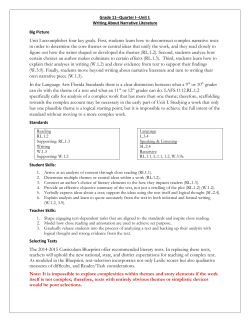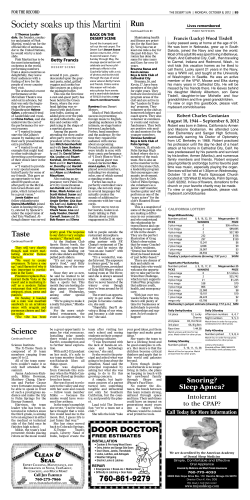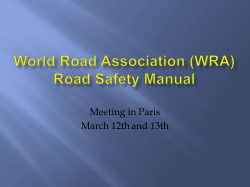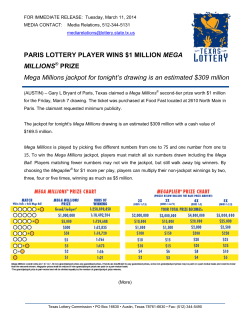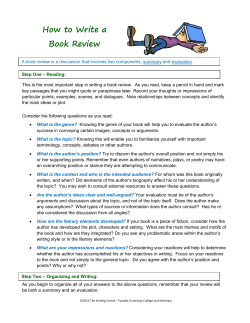
Research Thematic Areas of College of Health Sciences October, 2014
Research Thematic Areas of College of Health Sciences October, 2014 Background The Growth and Transformation Plan (GTP) is directed towards achieving Ethiopia’s long term vision and sustaining the rapid and broad based economic growth. At the heart of the overriding development agenda of GTP is sustaining rapid and broad-based growth path witnessed during the past several years and to eventually end poverty. One of the areas of focus of GTP is social transformation and infrastructure development, where higher learning institutions are expected to play a pivotal role in producing competent development workers at from first degree to PhD level. Cognizant of the aforementioned national vision and being a higher learning institution striving to be a leading University in the country, Jimma University had initiated graduate level trainings in various fields. Such expansible growth of postgraduate programs in the university has resulted in having 125 postgraduate programs in 2014 (15 PhDs and 110 Master and specialty certificates), of which many programs are run under the college of public health and Medical sciences. There are also different specialty areas in which the University is aspiring to initiate PhD programs in the future. All of these post graduate programs are required to do their independent research as a fulfillment of their degrees. However, giving even small amount of money will generate an expenditure of millions which become unbearable as the sheer number of students is escalating from time to time. On the other hand, the contribution of graduate and post graduate level training is deeply rooted in the quality of the trainees which again heavily rests on the quality of teaching, research and practical exposure to the service demands in the society. Most particularly, as PhD is a research based degree, it demands availability of research inputs more than the first degree and Master level training. Similarly, the staff research activity is also practiced in a fragmented manner which is often unable to provide holistic picture of development problems for policy consumption. On top of this, it is conducted in isolation from the student research project. To align the research process with the national development agenda, there is a need to streamline all research activities to bigger themes and merge student and staff research activities. Thematization of research is the process of defining the centers of excellence in research through developing themes and subthemes (areas of focus) based on international and national policies for development and the University’s vision and mission. Themes and subthemes serve as spring board for the development of Mega Research Projects embracing various focused research questions. For the benefit of common understanding the following operational definition is given to these terms. Theme – is a broader research areas that can address various related health issues through multidisciplinary and trans-disciplinary approach Sub-theme – is a subset of a theme that can address research area that are closely interrelated through multidisciplinary and/or trans-disciplinary approach. Mega Research Project (MRP) – is an overarching research question that can have at least three sub-research questions (topics) for instance that can lead to a PhD. Research topics - Specific research questions addressing a particular aspect of the mega research project. The following hierarchy is agreed to. Theme ======Sub-theme====Mega research project====Research Topic Thematization has a number of advantages such as addressing of research questions in a comprehensive manner and packaging of the recommendations emanating from research in a better shape for policy/practical consumption, reducing fragmented approach in research and interventions and fostering multidisciplinary and /or trans disciplinary research team building and scholastic culture. It will also enhance the quality of graduate training and ensures cost effectiveness and efficiency through controlling plagiarism and duplication of efforts. Considering its locational advantages and the different colleges it encompasses to execute research activities, Jimma University has identified the following thematic areas to serve as a framework for streaming all research endeavors towards its center of excellence. The themes were developed through participation of the colleges, stakeholders and policy and strategy of the government. Nutrition, Food security and livelihood: Enhancing Food Security, Improving Farm Earnings and improving Nutritional Status of the Community by Caring for the Natural Resource Base Heath and Health deliverability: Diagnosis of major Health problems, determinates of health, quality of health care and health institutions, and population growth Environment and Climate Change : Environment, ecology and climate change, mitigation and adaptation and Natural Resource Management for Sustainable Development Quality of Education : A closer look of Quality of Education at each stage to Invigorate livelihood and development in Ethiopia Social Justice and Democracy : Social Justice, Human rights, Governance and Democracy a means to improve livelihood Institutional Innovations and Management: Studies towards Poverty reduction, policy analyses, inequality and Development, Micro -financing and Change Management. Technology adaptation and transfer: Engineering and Technology Testing and Adaptation (Water and sanitation, Renewable and sustainable Energy, construction materials and ICT divides). Science for sustainability: Bridging science for research and development. The colleges public health and medical sciences has targeted research thematic areas that are relevant to fields of specialties in it to develop subthemes that serve the departments for generating mega research questions (Projects) and specific research questions The subthemes developed by CPMS and Mega Research Projects (MRP) to be developed by departments will pay due attention to the cross-curing issues including: gender and development, environment, community engagement, HIVAIDS and capacity building. After thorough deliberation of the among the taskforce members the following themes and subthemes were developed: Themes and subthemes for College of Health Sciences , Jimma University Theme I: : Infectious, Non-communicable disease and nutrition Sub-themes Emerging and re-emerging infectious diseases (Eg. TB and HIV) and 1. other infectious diseases Vectors and vector borne diseases, Neglected Tropical diseases(NTDS) 2. Nutrient intake, deficiency disorders, metabolic syndrome and 3. intervention strategies 4. Food security, Feeding, Growth, development and wellbeing Mental, neurological and substance use disorders 5. Chronic non-communicable and congenital diseases, and genetic 6. disorders Accidents and injuries 7. 8. Drug discovery, design, Development and Quality Control 9. Diagnostic Methods Development and Evaluation Theme II: Health systems and Policy Sub-themes 10. Health care delivery system, Human Resource Development for Health and Patient Care, 11. Health Economics, Health Commodity and Safety 12. Health Ethics and Forensic Medicine Theme III: Population, Health and Environment(PHE) Sub-themes 13. Ecology, climate change, and Toxicology 14. Waste Management; Water Sanitation and Hygiene(WASH) 15. Housing, Occupational and Institutional Health 16. Sexual and Reproductive health 17. Maternal and child health 18. Population Dynamics and Gender issues 19. Health Behavior and Communication Theme Description This theme includes, not limited to: Research ranging from health promotion, prevention, diagnosis, prophylaxis, treatment, prognosis, outcome, and post mortem analyses of all diseases. This theme includes, not limited to: Research ranging from human resource, infrastructure, health care delivery, health commodity, economic valuation and medico legal aspects. In summary it encompasses researches spanning from health inputs, processes, structure, outcome, impact and policy. This theme includes, not limited to: Researches encompassing overarching issues examining the interplay between populations, health in the life course and different environmental compartments (ranging from micro through meso to macro level) including physical, social and biological aspects. Regulations I. Authorship PI Conceives and designs the overarching research question of the mega project Define specific research questions together with co-investigators and post graduate students Authorship will be determined based on major contribution to the design, conduct, analyses and write up of the study as determined by the research team indicated by their application signature and declaration form. As the PI is major contributor, he/she shall hold the lead authorship (first or last) during publication depending on his/her contribution to the specific research topic to be decided by the team. However, in the case of PhD work, the candidate will hold the first position. On the other hand, in the case of MSc work, the candidate may not take primary authorship unless the candidate conceives the research idea. To improve or modify the original idea/patent/ product ownership/technology development conceived by a student, he / she should be consulted. Publication of a scientific work should be based on the agreement of all authors Vis ǎ Vis the above rules. In a research proposal submitted for funding that does not involve postgraduate students, a staff researcher can appear as PI only once and as a co-investigator only three times. II. Mega research projects need to be multidisciplinary. Financial management (Budget allocation and expenditures) Budget expenditure shall strictly follow the proposal budget breakdown. Shifting between the budget lines may be possible for up to 15% if approved by the respective authority. Each mega project shall have a budget ledger that can help track the expenditure items and facilitate the ease of generating statement of expenditures (SOE). Procurement of common items shall be made in bulk by the college as far as possible and released to each mega project based on the request Vis à Vis the available budget of the project. IRB members should be compensated for their time in ethical, scientific and budgetary review (eg. A retreat for reviewing proposals at least twice a year with full boarding and periderm should be arranged). The IRB shall invite a senior expert in the case of proposals that need specific technical review There should be a call once in a year (from January for the fund to be released in July) and the proposals for next year should be reviewed before July so that there is time for implementation of the research. IRB composition should include reviewers with different backgrounds so that the review process is facilitated. Proposal review process shall be double blinded. Funded research projects shall be posted on the website to avoid duplication of efforts across colleges. There is no role out of the fiscal year budget to the next year. Researches that take more than one year could be granted budget based on their annual activity plan. III. Data management and safety The electronic data shall be owned by the university and kept on the data system (server, encoder, data entry terminals, manager and editors) of the college. The college shall establish statistical support unit to facilitate data analyses. The college has to put a system for data use and sharing policy (storage, use policy and protection). Use of secondary data for publication and for thesis/dissertation shall be after the approval of the PI and or COPIs. Students or staff using the data for the thesis needs to have either the PI or COPIs as an advisor. If external users request to use the data, it should be approved by the college and authors based on the relevance of the purpose Anybody who does not abide to the aforementioned issues shall be subject to sue for violation of research ethics IV. Proposal review process (Acceptance and Rejection criteria) Collaborative multidisciplinary research is mandatory Rejection criteria 1. Scientifically and Ethically unsound 2. Lack of novelty (Proposals that do not contribute to new knowledge or address gaps in information) 3. Duplications (research conducted in the same set up, published papers, thesis works, or being worked by another person….), will be subject to academic punishment. 4. Research misconduct (Plagiarism, falsification, fabrication) will be subject to academic punishment. 5. Failure to incorporate comments by IRB or give justifiable rebuttals 6. Staff who did not submit terminal technical and financial report on the previous year 7. Proposals with conflict of interest that has not been settled 8. Proposals of PhD and MSc students not related to their thesis 9. PI in more than one proposal and CoPI in more than 3 proposals in one fiscal year 10. Proposals submitted by staff outside the CPHMS who are affiliated to other colleges will be referred to their respective colleges 11. Fragmented research topics that address only single research question 12. Research proposals outside the themes and subthemes of the university/and or the college 13. Proposals that are already funded by other sources. But matching fund is could be possible based on justifications. 14. Deliverables including: publications, policy briefs, products, technologies be stated on the research proposal. V. Responsibilities of PIs and Co-PIs PI will be responsible for all technical and administrative activities of the mega research project CoPI shall replace the PI in his/her absence and will be responsible for the technical and administrative aspect of the specific research projects First advisor of graduate student shall have an academic rank of assistant professor and above. In case where there is no staff with this rank the department should look for external advisors or supervisors (both within the University and outside). Students’ involvement VI. A graduate student can involve in the mega project through conceiving specific research question, supervision, data collection, data entry, data analyses, and write up of scientific paper. Students are encouraged to come up with a specific research question that is in line with the mega research project or can lead to the development of the mega project as part of their theses work. VII. Non-treasury source(Externally funded) projects VIII. As far as possible these projects shall align with the University and college themes and subthemes. It should also have a capacity building component (human, material, physical infrastructure…etc.). The proposal should contain an inbuilt monitoring and evaluation system IX. The college shall organize a research monitoring and evaluation unit. X. Books, Lecture notes, Manuals Mechanisms of funding development of these teaching materials should be developed by the university. The budget will be allocated from the research budget.
© Copyright 2025

